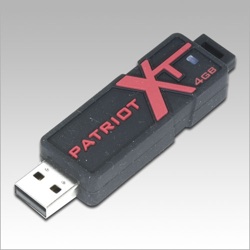|
Patriot Xporter XT 4 GB Ruggedized Flash Drive

Benchmarking
The specs revealed something to sweeten the deal still further - this thing was fast. Read speeds were specified as up to 30 mb/sec - generally pretty good, but up to can taketh away what the thirty mb/sec giveth... so I fired up XBench and got to the meat of it. Here's what I found:
| Run One | Results 0.96 System Info Xbench Version 1.3 System Version 10.5.3 (9D34) Physical RAM 2048 MB Model MacBookPro3,1 Drive Type Patriot Memory Disk Test 0.96 Sequential 27.83 Uncached Write 27.84 17.09 MB/sec [4K blocks] Uncached Write 23.01 13.02 MB/sec [256K blocks] Uncached Read 20.72 6.06 MB/sec [4K blocks] Uncached Read 62.04 31.18 MB/sec [256K blocks] Random 0.49 Uncached Write 0.13 0.01 MB/sec [4K blocks] Uncached Write 4.84 1.55 MB/sec [256K blocks] Uncached Read 815.05 5.78 MB/sec [4K blocks] Uncached Read 168.19 31.21 MB/sec [256K blocks] | |
| Run Two | Results 0.96 System Info Xbench Version 1.3 System Version 10.5.3 (9D34) Physical RAM 2048 MB Model MacBookPro3,1 Drive Type Patriot Memory Disk Test 0.96 Sequential 25.30 Uncached Write 21.38 13.13 MB/sec [4K blocks] Uncached Write 20.73 11.73 MB/sec [256K blocks] Uncached Read 21.21 6.21 MB/sec [4K blocks] Uncached Read 62.64 31.48 MB/sec [256K blocks] Random 0.49 Uncached Write 0.13 0.01 MB/sec [4K blocks] Uncached Write 5.30 1.70 MB/sec [256K blocks] Uncached Read 787.73 5.58 MB/sec [4K blocks] Uncached Read 168.40 31.25 MB/sec [256K blocks] | |
The Xbench test system was a Summer 2007 Macbook Pro, 2.4 ghz with 2 GB of DDR2 RAM, running the latest (1.3) version of Xbench in a standard disk test. While the write speed was not specified by Patriot, the read speed was... At first I assumed that it was the sort of truth that four color glossies usually tell, but if you'll glance back up to the bold term on that results chart, you'll see that it actually exceeds spec. Needless to say, this is rare, and very, very good for Patriot's credibility. While no spec was given for write speed, 13-17 MB/sec is very good compared to moderately fast flash memory like the Sandisk SD+USB cards, which is itself impressively fast compared to consumer-level USB 2.0 flash memory. Its write speed was considerably faster than Sandisk's flagship drive, the Cruzer Contour, in sequential tests which most closely represent the performance of a normal USB drive in handling the large files people deal with these days. Sandisk's flagship only performed better in random write speed, which while known to thrash lesser drives, was not an overwhelming advantage. A second run - after considerable 'normal' use and resulting memory fragmentation - provides a rather more day-to-day glimpse of the drive's performance, and while sequential write speeds have taken a dip, random speeds have been more or less unaffected, and sequential read speeds have actually had an uptick. Some of this difference can also be attributed to the wear-leveling algorithms that ensure that 'holes' are not worn in the drive's memory chips, sacrificing some raw speed for capacity and longevity.

|  |
CrystalDiskMark 2.1 | HD Tune 2.55 |
The CrystalDiskMark and HD Tune benchmakrs are provided for comparison, tested on a late-model Dell Optiplex GX620 using a 2.8 GHz Pentium D and two gigabytes of RAM. Both of these were completed at the same time as the second run of XBench, and should reflect real-world performance. Sequential read and write as reportd by CrystalDiskMark were both fairly close to the Xbench numbers, broadly translated as "really fast" and "fast". When smaller blocks were brought to bear, write speed suffered while read speed again had an extremely slight uptick - my wild guess is this relates to some artifice of the memory controller, and is not significant in actual use - but write speeds suffered. CrystalDiskMark benchmarks are not explicit about the actual type of blocks used - what size blocks are used for sequential write tests, and whether the small-block tests are sequential or random - but some conclusions can be drawn by comparing the results to Xbench, which gives very specific descriptions of its test types. The CDM 4K test results line up to within about five percent with the Xbench random 4K uncached tests, and HDTune's average write speed test showed similar average speeds - 27.7 MB/sec transfer rate, using a 64KB block size. Intriguing... I wonder where the cutoff is where everything goes to pot.
REAL TIME PRICING




